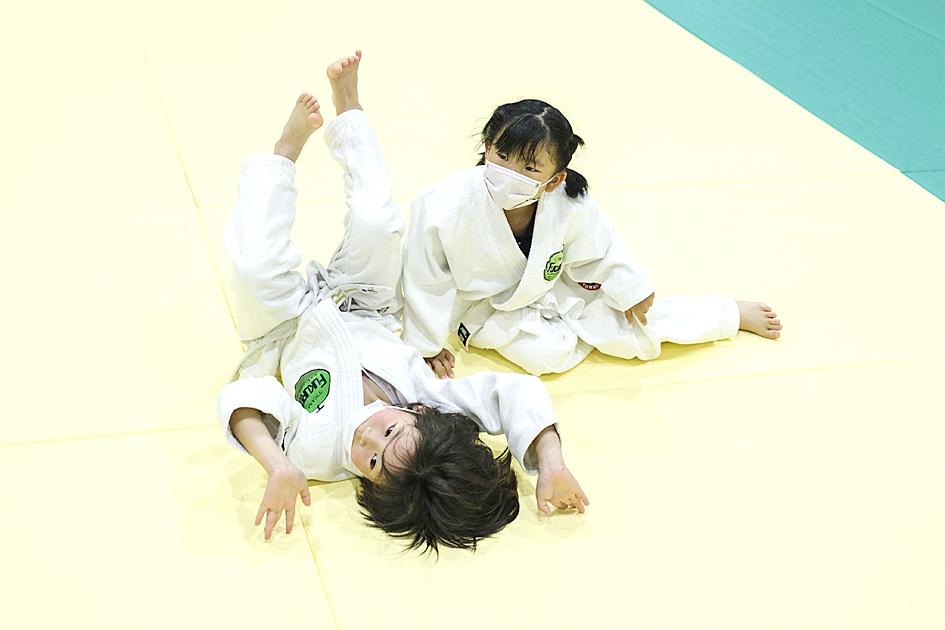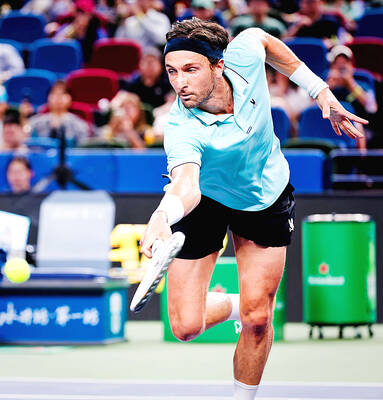Japan is the home of judo, but a brutal win-at-all-costs mentality, corporal punishment and pressure to lose weight are driving large numbers of children to quit, raising fears for the sport’s future in its traditional powerhouse.
Underlining the scale of the problem, the All Japan Judo Federation canceled a prestigious nationwide tournament for children as young as 10, saying that they were being pushed too hard.
A group dedicated to those injured or killed while practicing the martial art says 121 judo-related deaths were reported in Japanese schools between 1983 and 2016.

Photo: AFP
Japan dominates the Olympics judo medal table, but federation president Yasuhiro Yamashita said that the values of the sport are being lost as parents and coaches chase short-term glory.
“Judo is a sport that emphasizes humanity,” said Yamashita, who is also the president of the Japanese Olympic Committee and won gold at the 1984 Los Angeles Games. “If you see no worth in anything but winning, and the result is all that matters, that gets distorted.”
The number of people taking part in judo in Japan has plummeted by almost half since 2004 to about 120,000, the federation’s figures showed.
Children account for the steepest decline in numbers.
Young children are taught the same dangerous moves as Olympic athletes, and intense training regimes can leave them injured or burned out.
Parents and coaches have been known to berate referees during matches and corporal punishment still exists, despite reforms.
The All Japan Judo Federation decided to take action in March by canceling a national tournament for elite children aged 10 to 12, planning to replace it with events such as lectures and practice sessions.
The backlash was fierce with angry parents and coaches accusing the federation of dashing children’s dreams and jeopardizing Japan’s status as the bastion of judo.
Coaches who use corporal punishment can lose their licenses, but parents are harder to control.
Hisako Kurata, a representative of the Japan Judo Accident Victims Association, said that most parents “don’t think about the danger and just want their child to win.”
“Parents think that if their child wins a title, they’ll be happy. They think they’re doing it for their child,” said Kurata, whose 15-year-old son died in 2011 as a result of a head injury sustained at his high-school judo club. “The parents end up having the same win-at-all-costs mentality as the judo club.”
Mizoguchi, who has coached in France, said judo was “not fun” for Japanese children and that the “macho culture” surrounding the sport has had its day.
“You have to treat each kid with care and have a long-term vision for the future, otherwise Japanese judo has reached its limit,” she said.

Jesper Boqvist on Tuesday scored the go-ahead goal midway through the third period as the Florida Panthers, after raising their second straight NHL Stanley Cup banner, opened the defense of the title by beating the Chicago Blackhawks 3-2. Mackie Samoskevich — getting his second assist, the fifth two-point game of his career — chipped the puck toward the goal and Boqvist knocked it out of the air for the lead with 10 minutes, 20 seconds left. A.J. Greer and Carter Verhaeghe also had goals for Florida, who got 17 saves from Sergei Bobrovsky. Frank Nazar had a goal and an assist and Teuvo

HISTORIC CHANCE: Indonesia would qualify for their first FIFA World Cup since 1938 if they defeat Saudi Arabia and Iraq on Wednesday and Saturday respectively Almost 90 years after their first and only appearance at the FIFA World Cup, Indonesia are just two victories away from returning to the tournament. It would mark a major turnaround in fortunes in just more than three years since 135 spectators died at the Kanjuruhan stadium disaster in East Java on Oct. 1, 2022, as security forces fired tear gas at spectators, causing a stampede for the exits in a domestic match. If Indonesia can defeat Saudi Arabia and Iraq on Wednesday and Saturday respectively, in a qualifying tournament, then they would advance to the 2026 World Cup to be cohosted

Unlike his fellow American basketball player, Brittney Griner, Jarred Shaw has received scant attention after being arrested for a drug offence abroad. When Jarred Shaw, an American basketball player in Indonesia, stepped down to the lobby in his apartment complex in May to collect a package containing illegally imported cannabis gummies, he thought that the medicine to ease his Crohn’s disease had arrived. It had, but so too had 10 undercover police officers. A video on social media showed Shaw, wearing a black T-shirt and shorts, shouting for help as the swarm of officers moved to apprehend him. The 35-year-old from Dallas, Texas,

World No. 3 Alexander Zverev on Monday said that he was playing “terrible tennis” after he was knocked out of the Shanghai Masters by France’s Arthur Rinderknech 4-6, 6-3, 6-2. His exit leaves Novak Djokovic as the tournament’s top-ranked player, increasing the 38-year-old Serb’s chances of winning a record-extending fifth title in the Chinese financial hub. In stifling conditions, world No. 54 Rinderknech came back from a set down to stun an increasingly rattled Zverev into submission. It is the second time the Frenchman has beaten him, after bundling him out of Wimbledon earlier this year. A despondent Zverev told reporters the match had